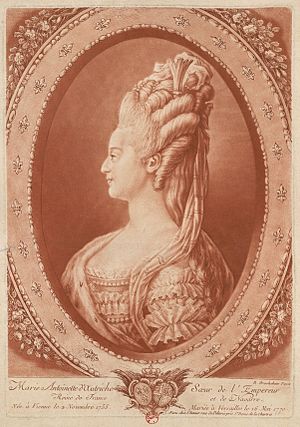Richard Brookshaw facts for kids
Richard Brookshaw (born in 1748, and last known to be alive in 1779) was a talented English artist. He was known for making special kinds of prints called mezzotints. An engraver uses tools to carve designs onto metal plates, which are then used to print pictures.

The Life of Richard Brookshaw
Richard Brookshaw started his career by making smaller copies of popular prints. He copied works by famous engravers like James MacArdell and James Watson.
Moving to Paris, France
Later, Brookshaw moved to Paris, France. He set up his art studio there. In 1773, he created two very important portraits. These were of the Dauphin, who later became King Louis XVI, and Marie Antoinette. These prints became incredibly popular. Because people loved them so much, Brookshaw made five different versions of these portraits in various sizes.
His Time in France
People in France really admired Brookshaw's artistic skills. While living there, he created many excellent prints. These prints are quite rare and hard to find today. It is not known if he ever went back to England. The exact place or date of his death is also a mystery. The last time he was mentioned was for some prints in a book called "Pomona Britannica." This book was about plants and was illustrated by his brother, George Brookshaw, in 1804.
Famous Artworks
Some of Richard Brookshaw's best works were made in France. These include the popular portraits of King Louis XVI and Marie Antoinette. He also created portraits of the Duke of Orleans, the Countess d'Artois, and the Countess de Provence.
He also made prints while in England. These include:
- 'Christ on the Cross,' based on a painting by Anthony van Dyck (1771).
- 'Thunderstorm at Sea,' based on a painting by Hendrik Kobell (1770).
- 'The Jovial Gamesters,' based on a painting by Adriaen van Ostade.
- Portraits of Miss Greenfield (1767).
- Portraits of Miss Emma Crewe and her sister, based on paintings by Sir Joshua Reynolds.
 | Percy Lavon Julian |
 | Katherine Johnson |
 | George Washington Carver |
 | Annie Easley |

